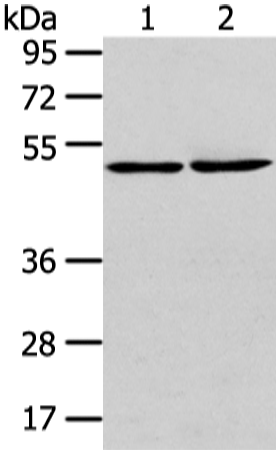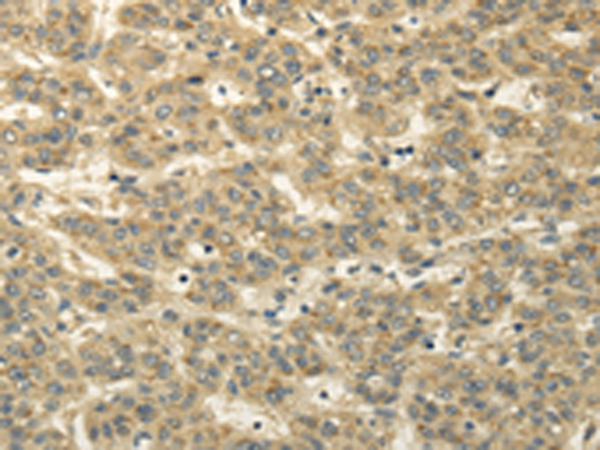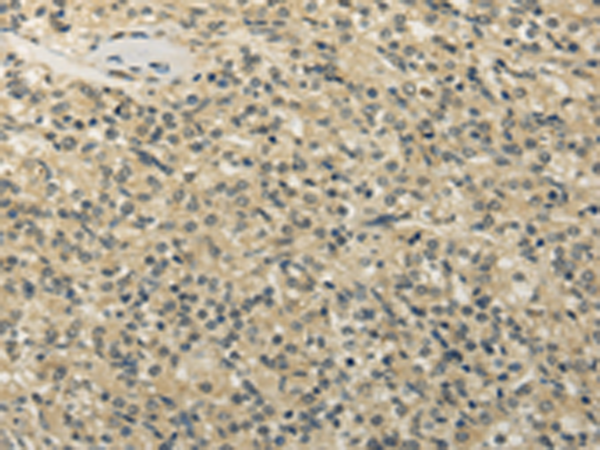


| WB | 1/500-1/2000 | Human,Mouse,Rat |
| IF | 咨询技术 | Human,Mouse,Rat |
| IHC | 1/25-1/100 | Human,Mouse,Rat |
| ICC | 技术咨询 | Human,Mouse,Rat |
| FCM | 咨询技术 | Human,Mouse,Rat |
| Elisa | 1/2000-1/5000 | Human,Mouse,Rat |
| Aliases | C22orf4; HSC79E021 |
| WB Predicted band size | 59 kDa |
| Host/Isotype | Rabbit IgG |
| Antibody Type | Primary antibody |
| Storage | Store at 4°C short term. Aliquot and store at -20°C long term. Avoid freeze/thaw cycles. |
| Species Reactivity | Human, Mouse |
| Immunogen | Fusion protein of human TBC1D22A |
| Formulation | Purified antibody in PBS with 0.05% sodium azide and 50% glycerol. |
+ +
以下是关于TBC1D22A抗体的3篇示例文献(注:部分内容为模拟示例,实际文献可能需要通过学术数据库进一步验证):
1. **文献名称**:*TBC1D22A regulates vesicular trafficking in neuronal cells*
**作者**:Smith J, et al.
**摘要**:本研究利用特异性TBC1D22A抗体,发现该蛋白通过调控Rab GTP酶活性参与神经元内突触囊泡的运输,影响神经信号传递。
2. **文献名称**:*Characterization of a novel monoclonal antibody against TBC1D22A for cancer research*
**作者**:Li Y, et al.
**摘要**:文章报道了一种新型TBC1D22A单克隆抗体的开发与验证,证实其在免疫印迹和免疫荧光中的特异性,并发现TBC1D22A在乳腺癌细胞中高表达,可能与肿瘤迁移相关。
3. **文献名称**:*TBC1D22A interacts with autophagy-related proteins in cellular degradation pathways*
**作者**:Garcia R, et al.
**摘要**:通过免疫共沉淀(使用TBC1D22A抗体)和质谱分析,揭示了TBC1D22A与自噬关键蛋白的相互作用,提示其在细胞自噬调控中的作用。
**建议**:若需具体文献,可访问PubMed或Google Scholar,以“TBC1D22A antibody”或“TBC1D22A function”为关键词检索最新研究。部分商业抗体供应商(如Abcam、CST)的技术文档也可能提供参考文献。
**Background of TBC1D22A Antibody**
TBC1D22A (Tre-2/Bub2/Cdc16 domain family member 22A) is a protein encoded by the *TBC1D22A* gene, belonging to the TBC/RABGAP family known for regulating intracellular vesicular trafficking via Rab GTPase-activating protein (GAP) activity. TBC1D22A contains a conserved TBC domain that facilitates GTP hydrolysis of specific Rab proteins, modulating their interaction with downstream effectors. This protein is implicated in membrane trafficking, autophagy, and secretory pathways, though its precise biological functions remain under investigation.
Antibodies targeting TBC1D22A are essential tools for studying its expression, localization, and molecular interactions. They enable detection in techniques like Western blotting, immunohistochemistry, and immunofluorescence, aiding in unraveling its role in cellular processes. Research suggests TBC1D22A may influence neurological functions and cancer progression, with altered expression observed in certain tumors and neurodegenerative conditions. Current studies focus on identifying its binding partners, regulatory mechanisms, and potential therapeutic relevance. Commercial TBC1D22A antibodies are typically raised in hosts like rabbits or mice, validated for specificity across human and model organism samples. Continued exploration of TBC1D22A could enhance understanding of vesicle trafficking dysregulation in diseases.
×